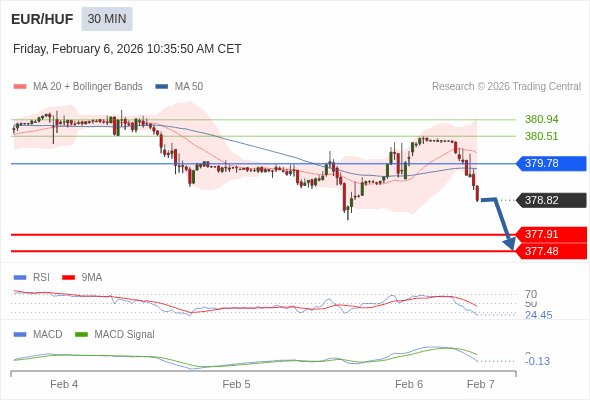EUR/HUF
EURHUF377.810USD
Today
-0.49%
5 Days
-0.73%
1 Month
-1.71%
6 Months
-5.00%
Year to Date
-1.44%
1 Year
-6.59%
Key Data Points
Opening Price
379.680Previous Closing Price
379.670Indicators
The Indicators feature provides value and direction analysis for various instruments under a selection of technical indicators, together with a technical summary.
This feature includes nine of the commonly used technical indicators: MACD, RSI, KDJ, StochRSI, ATR, CCI, WR, TRIX and MA. You may also adjust the timeframe depending on your needs.
Please note that technical analysis is only part of investment reference, and there is no absolute standard for using numerical values to assess direction. The results are for reference only, and we are not responsible for the accuracy of the indicator calculations and summaries.
EUR/HUF Trading Strategy

Trading Strategy
The configuration is negative.
Alternative scenario
above 379.78, look for 380.51 and 380.94.
Comment
the downside prevails as long as 379.78 is resistance
EUR/HUF News
HUF: Growth shortfall weighs on prospects – Commerzbank
Commerzbank's report by Tatha Ghose, analyzes the Hungarian Forint's (HUF) performance amid economic challenges. Despite a recent recovery following a dovish central bank stance, disappointing GDP growth figures raise concerns about the currency's future.

HUF: Central bank green lights rate cuts – ING
The National Bank of Hungary maintained its tone during a recent meeting, with no immediate indication of rate cuts. However, the market reaction suggests a green light for potential cuts in February, especially if January inflation data supports this.

HUF: Cutting cycle expected to start – ING
The National Bank of Hungary is expected to maintain rates at 6.50% in its upcoming meeting, with a potential rate cut anticipated in February. Analysts at ING note that the market sees a 60/40 chance in favor of a rate cut, influenced by January inflation data.

HUF: Hungary Central Bank turns dovish – ING
Hungary’s central bank kept rates unchanged but struck a notably dovish tone, opening the door to rate cuts and pushing markets to price in deeper easing, with EUR/HUF facing renewed upside pressure, ING's FX analyst Frantisek Taborsky notes.

HUF: Moody’s holds Hungary rating, markets react positively – ING
Markets welcomed Moody’s decision to maintain Hungary’s sovereign rating with a negative outlook, seeing the risk of a downgrade as already priced in after higher fiscal targets were announced.

Hungary’s central bank poised to hold rates at 6.50% – BBH
The National Bank of Hungary is expected to keep its policy rate at 6.50% for a 14th straight meeting, maintaining a hawkish stance as inflation remains above target.

More Details of EUR/HUF
Is the EURHUF a major currency pair?
Should I use leverage when trading EURHUF?
How can I analyze the EURHUF pair?
Related Instruments
Popular Symbols


